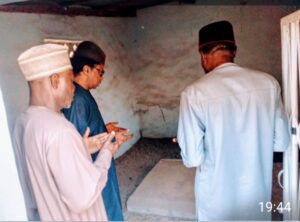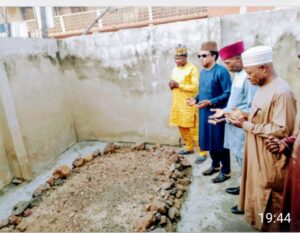

By Correspondent in Lokoja.


In a historic moment of reflection, Senator Shehu Sani, a prominent civil rights activist, called on Nigerians and governments at all levels to honor the nation’s freedom fighters who valiantly resisted colonial rule.
The Senator made this impassioned appeal during his visit to Lokoja, where he paid homage to the tombs of six deposed Emirs who defied British colonial rule.
These traditional leaders were exiled to Lokoja, where they lived out their final days.
Speaking on the significance of his visit, Sani, accompanied by his colleague, Comrade Suleiman Ahmed, described the Emirs as heroic defenders of Nigerian sovereignty.
“Today, I am visiting the tombs of Emirs from Northern Nigeria who were deposed by British colonialists for refusing to submit to foreign domination. Among them is the late Emir of Kano, Mallam Aliyu Abdullahi (Maisango), who passed away in 1903,” Sani said.
He emphasized the importance of preserving the memory of these leaders, stating, “We must appreciate those who stood for freedom and justice, sacrificing their lives to protect our territorial integrity. Their resistance serves as a powerful reminder of our nation’s enduring spirit.”
Our correspondent reports that the six tombs visited include those of:
Mallam Aliyu Abdullahi (Maisango), Emir of Kano (d. 1903)
Mallam Ibrahim Abubakar, Etsu Nupe of Bida (d. 1911)
Mallam Aliyu Dansidi, Emir of Zazzau (d. 1924)
Muhammadu Aliyu, Emir of Gwandu (d. 1902)
Mallam Mohammadu Lawal Kwassau, Emir of Zaria (d. 1927)
Sarki Abubakar, Emir of Gumel.
Senator Sani reaffirmed his commitment to honoring Nigeria’s anti-colonial heroes and urged Nigerians to draw inspiration from their bravery.
“As we chart our path forward as a nation, let us remember and celebrate those who stood for freedom and justice. Their legacy must never be forgotten,” Sani said.
The many residents in Lokoja described the Senator’s visit as a poignant reminder of Lokoja’s historical significance as a resting place for leaders who resisted colonial subjugation, immortalizing their sacrifice for generations to come.
Edited by Dada Ahmed.

